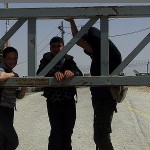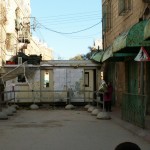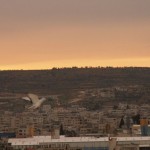
Filmed and produced by Cat Rabenstine for the Christian Peacemaker Teams in Palestine.
Life in the West Bank

Filmed and produced by Cat Rabenstine for the Christian Peacemaker Teams in Palestine.

CPTnet 17 December 2010
A newsletter written by members of the Christian Peacemaker Teams.
SOUTH HEBRON HILLS  On 14 December 2010, the Israeli military demolished three water cisterns and two wells in the arid and hilly Khashem Ad Daraj/Hathaleen region, about twenty-six km southeast of Hebron/al-Khalil on Tuesday. The military gave no reason for the destruction of the wells and cisterns.
The demolitions follow a pattern of destruction of Palestinian property by the Israeli military in the Oslo Accords-defined Area C.
The Israeli army failed to deliver demolition orders to the residents of the villages in the area and instead left them under a stone two days earlier for the residents to find.
The demolished cisterns and wells supplied drinking water to the villagers as well as their sheep and goats, the primary sources of food and income for the villages in the area.
The wells were up to 300 meters deep and over seventy years old, pre-dating the 1967 occupation of the Palestinian Territories. The Israeli military claims that it does not destroy structures created before 1967.
The region receives an average yearly rainfall of between 150-250 mm.*
*Applied Research Institute, Jerusalem & United Nations World Food Programme. February 2010 Report.

CPTnet AT-TUWANI UPDATE: October 2010
The At-Tuwani team had between two to three CPTers serving during the month
of October.
School Patrol
Together with the members of Operation Dove, the team monitored the Israeli
military accompaniment of the school children from the Tuba area as they
passed near the Israeli settlement of Ma’on. Twice the soldiers failed to
arrive in the afternoon, and the internationals accompanied the children back
to Tuba. Four settlers, with faces masked, chased the children during one of
these accompaniments, but no verbal or physical contact with the settlers
occurred, and no one was injured. On another occasion, two high school
students were returning to Tuba when two masked settlers stole the donkey
they were riding. Â Later the donkey appeared back in Tuba missing its
saddle.
Shepherd Accompaniment
Team members often spent Friday or Saturday nights at Tuba and accompanied
young shepherds in the morning as they grazed their flocks near the Ma’on
settlement barns. When settlers approached, the shepherds generally left the
area quickly. Israeli soldiers on one occasion chased young shepherds back to
Tuba and arrested their brother, a university student, when he videoed the
soldiers’ actions. He was taken to an army base and held for five hours. On
one occasion, two masked settlers attacked two members of Operation Dove as
they returned from accompanying shepherds, but did not injure them. The next
day, a settler on horseback challenged two CPTers and warned them to stay off
the road to Tuba. Three more settlers appeared and watched the CPTers as they
took a longer route.
Israeli Army Checkpoints
Soldiers often set up a temporary army checkpoint at the junction of the
settler-only highway and the road from At-Tuwani to Yatta. They stopped
most vehicles and checked IDs, possibly looking for labourers travelling to
or from Israel illegally across the nearby green line. Â CPT and/or the Doves
monitored the checkpoint and intervened when soldiers detained Palestinians
for a longer time than usual. Sometimes they were able to engage the soldiers
in conversation about what they were doing and why.
Advocacy
A visitor from England spent a day with the team, and a delegation of thirty
Mennonites from the U.S. and Canada visited to see and hear the stories of
nonviolent resistance practiced by the people of At-Tuwani to the occupation
and confiscation of their land by Israeli settlers and soldiers. The team
helped a Palestinian couple from At-Tuwani prepare for a November speaking
tour in Italy.
Olive Harvest
The army seemed to have orders to protect the farmers from settler attack
during their olive harvest. While the families from At-Tuwani were in the
Humra valley near the Ma’on settlement, two army jeeps remained on the road
between the valley and the settlement for the entirety of the olive harvest,
which passed without incident.

ISRAELI SOLDIERS DETAIN FIVE PALESTINIAN SCHOOL BOYS IN SOUTH HEBRON HILLS
[Note: According to the Fourth Geneva Convention, the Hague Regulations, the International Court of Justice, and several United Nations resolutions, all Israeli settlements and outposts in the Occupied Palestinian Territories are illegal. Most settlement outposts, including Havat Ma’on (Hill 833), are considered illegal also under Israeli law.]
November 21st, 2010
At-Tuwani – Christian Peacemaker Teams Press Release: Claiming that the children were throwing stones, Israeli soldiers detained five Palestinian schoolboys.
Since the beginning of 2005, the children from the village of Tuba wait every morning for an Israeli army escort to accompany them to the school in At-Tuwani, along the shortest road that goes through the Israeli settlement of Ma’on and the illegal outpost of Havat Ma’on. The escort’s task is to protect the children from the violence of the Israeli settlers of Havat Ma’on.
On the morning of November 21st, Palestinian schoolchildren had been waiting for over an hour near the settlement chicken barns when, at about 8:50 am, the soldiers arrived to escort the children to school past Havat Ma’on. Instead of escorting the children, however, the soldiers stopped and talked with the settlement security guard while the children waited on the road nearby. While the soldiers and the security guard were talking, two settlers passed the children.
After waiting for 15 minutes, two of the schoolchildren left for school on their own, unaccompanied. The other 13 children waited for another five minutes, then turned around and left to head back home. The soldiers remained with the security guard.
As the children were arriving at their villages of Tuba and Maghayir Al-Abeed, the same soldiers drove up, and, shoving away two internationals from Christian Peacemaker Teams, grabbed five boys and put them in the army vehicle. The soldiers took the boys back to the settlement barns, where, according to the children, they asked them no questions, but made them sit against a barn. After holding them for 15 minutes, the soldiers released the boys.
As the boys were leaving, the captain told the internationals “tell the children’s parents that if the boys throw stones again, it won’t be like this time. There will be problems.”
“I was waiting with the kids for over an hour, and I never saw them throw stones” said Joe Yoder, member of CPT. “Even if they were throwing stones while they were playing around, I don’t see how that’s an offense that merits soldiers coming into their home and carrying them off like criminals. If the army would just arrive on time, then there wouldn’t be a problem in the first place.”
Schoolchildren from Tuba and Maghayir al Abeed rely on the Israeli army to escort them past the settlement of Ma’on and the illegal outpost of Havat Ma’on, where Israeli settlers have committed acts of violence against the schoolchildren in the past.
These kinds of incidents are the evidence of the Israeli military escort’s failure to protect the children from settler’s violence. In the last school year, the children were attacked 19 times, they waited for the escort 53 hours and they missed almost 27 hours of classes.
A more detailed report about the military escort of schoolchildren in South Hebron Hills will be published in the next few weeks.
Christian Peacemaker Teams and Operation Dove have maintained an international presence in At-Tuwani and South Hebron Hills since 2004.

We may not currently have the might of the Israeli army nor the power of traditions confining us in certain roles, however, we know that one woman standing behind another in a line of solidarity is a force more powerful than both.
Dear friends and supporters of At-Tuwani village,
We would like to invite you to support a force more powerful than violence: the voices of Palestinian women. In late November 2010 , Humanity Together will host Keifah Addera and her husband Nasser on a speaking tour in Italy. Keifah will be speaking about the experiences of women in At-Tuwani as they nonviolently resist both the Israeli occupation and sexism. We hope that you will consider financially supporting this exciting project.
The people of At-Tuwani have often told their allies that the most important way we can support their struggle is to share their stories in our own communities. Keifah Addera, the organizer of the At-Tuwani Women’s Cooperative, is a powerful voice uniquely able to speak about the resistance of Palestinian women. While in Italy, Keifah will speak about the effect of the Israeli occupation and settler violence on women and children in Tuwani as well as the women’s cooperative’s work for justice and gender equality. Keifah’s husbandwill speak about his experiences as a prisoner in Israeli jail after being arrested for his participation in nonviolent demonstrations. Keifah and Nasser will present at the annual Italian Pax Christi peace conference as well as other public meetings in Rome, Trento, Ravenna, and several other locations.
Few Tuwani residents are as experienced in speaking with visitors as Keifah. She often hosts groups in Tuwani and has a rare talent for creating relationships with the people she meets. For this reason we are excited by the opportunities for building international support and women’s solidarity that this trip will provide. We are trying to raise 2,500 euros to cover the cost of flights, visa procedures, lodging, transportation in Italy, and food expenses. To donate, follow this link to our Pay Pal. Thank you so much for your support
In solidarity,
Read more about the folks in At Tuwani.